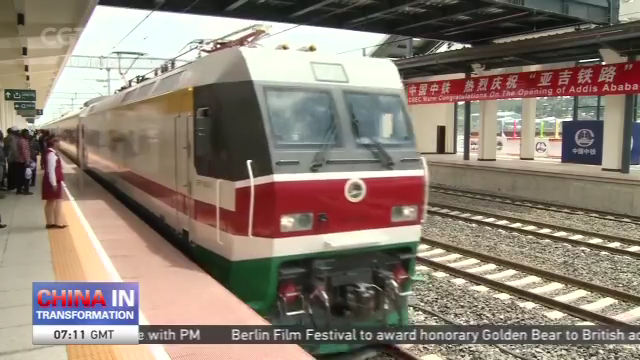
16:27, 18-Dec-2018
Ethiopia-Djibouti Railway: Chinese-constructed railway eases transport costs for users
Updated
15:22, 21-Dec-2018
02:34

The Ethiopia-Djibouti railway that was constructed with the assistance of China has reduced transport cost from Port Djibouti to landlocked Ethiopia. Ethiopia depends on majority of its exports and imports from Port Djibouti and this railway is assisting traders to get their goods to Ethiopia within just a day. The country is now planning to set up industries along the railway line to boost its economy. Coletta Wanjohi reports from Addis Ababa.
Since January this year, this railway that connects Ethiopia to Djibouti has eased mode of transportation for traders.
Cargo trains have a capacity to carry some 3500 to 4000 tons of freight, with the Ethiopian government anticipating up to 7 million tons of cargo annually.
GEDION JALATA CEO, CENTER OF EXCELLENCE INTERNATIONAL "That has contributed a lot since Ethiopia is a landlocked country. It used to take 6 to 7 days to bring goods by trucks from the port of Djibouti but now it takes only like a day to bring."
The United Nations Development Programme in Ethiopia has launched a report dubbed "Industrialization with a human face".
It recognizes the critical role that this cross border railway will have in boosting the manufacturing sector in the country.
JAMES WAKIAGA SENIOR ECONOMIST, UNDP ETHIOPIA "Ethio - Djibouti railway for example is important in terms of not only providing the logistical support that is needed in spurring the industrialization but also in opening up the country as more industrial zones are being created and this will have a very positive externalities in the industrialization process."
But beyond just a connection between the two countries, economists say the project is a stimulant for regional growth.
JAMES WAKIAGA SENIOR ECONOMIST, UNDP ETHIOPIA "The whole idea of belt and road initiative is to create a connection between all the countries , we would like to see a railway connection between Kenya and Ethiopia as well, another one which can go all the way to Egypt and so in the end we have connectivity between all the African countries and this will have benefit in terms of advancing regional integration in the continent."
The 752.7km railway was constructed with a total investment of $4bn. The Ethiopian section of the line cost $3.4bn, 70% of which was provided by China Exim Bank and 30% by the Ethiopian government.
COLETTA WANJOHI ADDIS ABABA, ETHIOPIA "The World Bank recognizes China's role in supporting investment in key infrastructure projects like this Ethiopia Djibouti railway. It says that the continent still needs a lot of assistance in order to develop its economy and there is enough room for many financiers. COLETTA WANJOHI, CGTN, ADDIS ABABA, ETHIOPIA."

SITEMAP
Copyright © 2018 CGTN. Beijing ICP prepared NO.16065310-3
Copyright © 2018 CGTN. Beijing ICP prepared NO.16065310-3